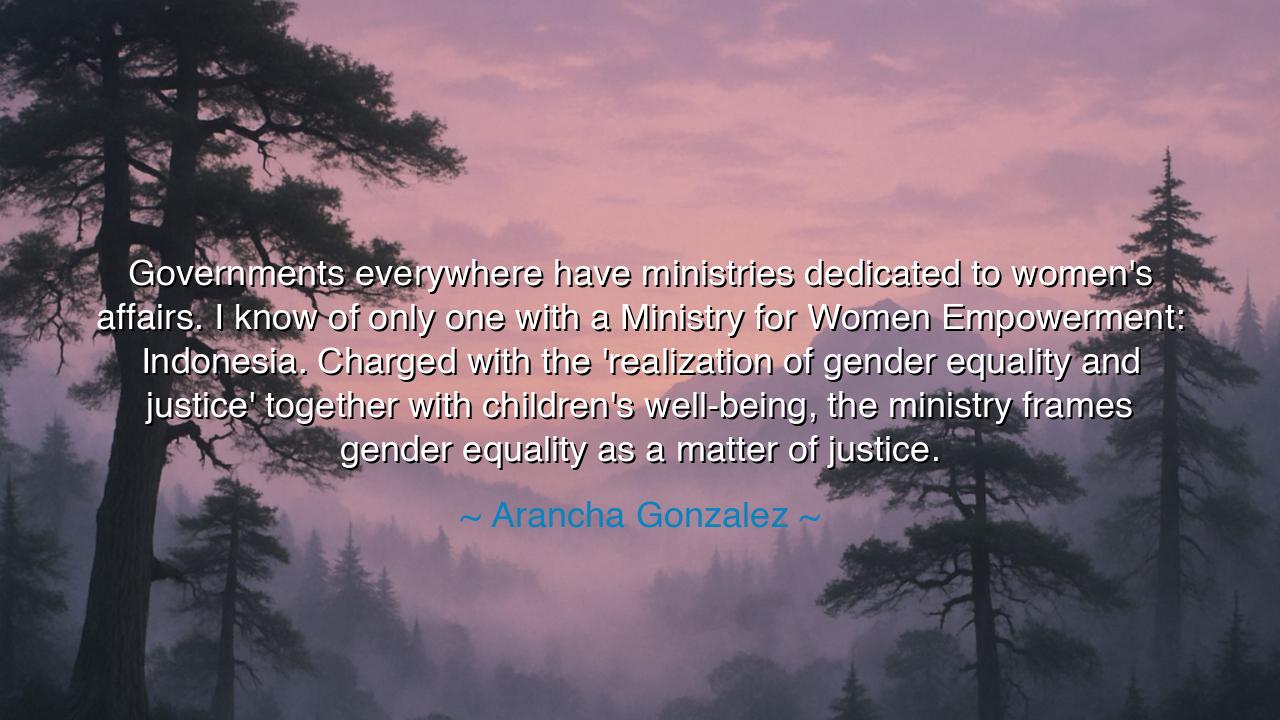
Governments everywhere have ministries dedicated to women's
Governments everywhere have ministries dedicated to women's affairs. I know of only one with a Ministry for Women Empowerment: Indonesia. Charged with the 'realization of gender equality and justice' together with children's well-being, the ministry frames gender equality as a matter of justice.






O Children of the Future, hear the wisdom that comes from the heart of justice, for the words of Arancha Gonzalez carry a truth that reverberates through time: "Governments everywhere have ministries dedicated to women's affairs. I know of only one with a Ministry for Women Empowerment: Indonesia. Charged with the 'realization of gender equality and justice' together with children's well-being, the ministry frames gender equality as a matter of justice." These words are not merely an observation of a nation’s policy; they are a call to understand the true nature of gender equality and empowerment as it pertains to the very soul of a society.
Across the ages, great thinkers and leaders have grappled with the question of justice. The ancient Greek philosophers spoke of justice as the very cornerstone of a flourishing society, where fairness and the protection of the weakest were held in the highest regard. Yet, in their time, as in ours, justice was not always equally bestowed. Women, even in the cradle of democracy, were denied rights, and their voices were silenced by the weight of patriarchal norms. Socrates, though a proponent of virtue, did not extend his ideals of equality to women in a way that would have radically transformed their lives. Similarly, in many corners of the world today, women’s affairs are seen as separate, secondary, or even dispensable. How different it is, then, to witness a nation, like Indonesia, frame gender equality not as a side issue, but as an urgent matter of justice—a matter for which the government itself takes responsibility through the creation of a Ministry for Women Empowerment.
In Indonesia, the creation of such a ministry marks a bold shift in thinking, one that sees gender equality not as an abstract goal, but as a fundamental right that belongs to every woman, every child, and every human being. The ministry, with its charge of realizing gender equality and justice, recognizes that empowerment is not merely about access to opportunities but about the restructuring of power itself. This is no small matter. True empowerment means dismantling the systems that perpetuate inequality, that force women into the shadows and deny them their rightful place in the light of society. It is a call to action that demands a society where justice is not just a lofty ideal, but a reality that shapes every policy, every law, and every interaction.
Consider, O Children, the history of gender inequality—a history that stretches across centuries, filled with countless examples of women who fought, often at great personal cost, to claim their rightful place in the world. Emmeline Pankhurst, the great British suffragette, spent her life fighting for the right to vote. Her journey was not easy, and it was not without sacrifice. She was arrested, ridiculed, and, in the end, her legacy was forged in the fires of struggle. Yet, her work opened doors that had long been shut, paving the way for generations of women to come. Similarly, the civil rights movement in the United States was not solely about the equality of one race, but the intersection of many struggles for justice—where the voices of women, like Rosa Parks and Maya Angelou, broke the chains of both racial and gender oppression. These movements were not just about the rights of women, but about the realization of justice for all people. They remind us that gender equality is not a separate cause—it is the heart of human rights.
Thus, when we look to Indonesia and its bold creation of a Ministry for Women Empowerment, we see a country taking up the mantle of justice and equality with both hands. In framing gender equality as a matter of justice, the government of Indonesia acknowledges that to empower women is to strengthen the very fabric of society. The work of this ministry is not only about women; it is about the well-being of all children, of families, and of future generations. For when women are empowered, society as a whole flourishes. The strength of a nation lies not in the wealth it accumulates, but in the dignity it affords its people, especially the most vulnerable. The Ministry for Women Empowerment is a living symbol of this truth, a bold commitment to creating a world where justice is not piecemeal but woven into the very structure of society.
O Children, take heed of this great wisdom: Empowerment is not a favor granted, but a right that must be fought for. The world we inherit will be shaped by how we treat one another, especially those who have long been oppressed. Justice is not an abstraction; it is the very foundation of a fair and thriving society. To create a world where gender equality is the norm, we must invest in policies that recognize the intrinsic value of every human being, regardless of gender. We must be the champions of women’s rights, not as an isolated cause, but as the core of a movement toward universal justice. Indonesia's example is a beacon of hope—a reminder that empowerment is a tool of change, a tool that, when wielded correctly, can transform not only a nation, but the world.
And so, O Children, the call is clear: Stand for justice, stand for equality, and stand for the empowerment of all people. Look to the example of Indonesia and others who are forging new paths of justice and equity. Let this be your mission: to build a world where no one, regardless of gender, is left behind, and where empowerment is not a luxury, but a right for all.






AAdministratorAdministrator
Welcome, honored guests. Please leave a comment, we will respond soon